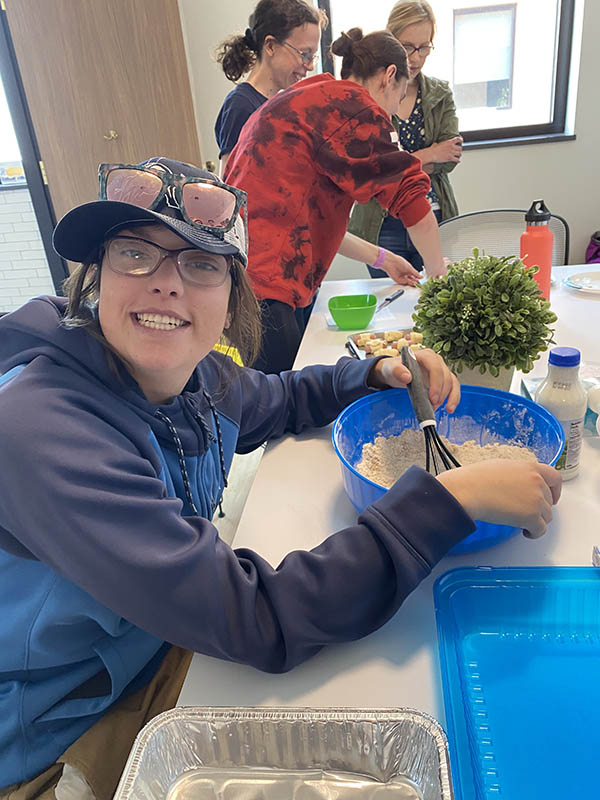Research offers skills list for college-bound students with intellectual disabilities

Ava Jennings of Park City looks up from cooking with the Aggies Elevated program at
Utah State University. Making healthy food choices was #22 on the list.
A study published in the Journal of Inclusive Postsecondary Education offers a list of skills that parents of college students with intellectual disabilities said would help students as they prepare to go to an inclusive college program.
The parents surveyed all had children who had attended a program designed to support students with intellectual disabilities at college. They agreed on a list of 30 important skills, with the first nine showing the most consensus, said Dr. Jefferson Sheen, the study’s lead author. Much of the work done on the publication happened when he was with the Institute for Disability Research, Policy & Practice. Sheen was the co-principal investigator of Aggies Elevated, USU’s inclusive college program for students with ID. He is currently an assistant professor of Social Work at Utah State University.
Sheen said his experience with Aggies Elevated shaped the research. It is also timely; the number of higher education programs for students with ID has grown rapidly over the past few years, both inside and outside of Utah. “How do we help students take full advantage of the opportunity?” he asked. “Some were really ready to go, some were less ready to go.”
Parents of students responded to three rounds of questions on the topic, recommending that students entering inclusive higher education be able to:
- Follow instructions or directions;
- Ask for help or clarification in a variety of settings;
- Manage medications independently;
- Demonstrate basic hygiene skills without regular prompting;
- Accept responsibility for their actions;
- Demonstrate resilience;
- Show kindness to themselves and others;
- Demonstrate personal safety awareness, understanding “stranger danger,” how to navigate safely in a new environment, know who to contact in an emergency and what to do when feeling unsafe;
- Show time management skills like tracking time on a watch or phone, following a schedule without prompts, and using a planner.
A complete list of skills is available at the end of the published study.
Dr. Ty Aller, a co-author of the study, said it’s important to understand what the research does and does not say about the skills. It is not so much a collection of absolutes as a list of things parents said were important, “which gives us a really useful pool of items to do more research on, to see if they influence outcomes.”
That said, the skills noted by parents are important for moving into the adult world. “What we know that helps support these transition skills are just learning experiences,” Aller said. “Anything that's going to give you actual practical application and a chance to not only succeed, but to fail and learn from the failures. So it’s that dignity of risk concept that often comes up with parents, when I work with them in therapy.” Often parents will say they can’t allow their child with a developmental disability do something. “I ask why, and they might say something to the effect of, ‘Well, we don't want them to fail, or we're worried about them not succeeding so we just protect them from it.’”
But the freedom to choose is a great teacher, even if it includes ‘failure’. Granting it could mean introducing the teenager to new experiences. “With teens experiencing social anxiety that I've worked with, it could be as simple as going into the grocery store and buying their favorite candy bar at lunchtime,” Aller said.
Sheen said the skills list is not exclusive to students with intellectual disabilities. Many people could learn more about being kind to themselves. “We’re all hard on ourselves, and these students are no exception,” he said.
And the preparation needs to begin well before the student graduates. Understanding the student’s own level of preparation can also help the family as they begin selecting the right inclusive college program for their child. “The sooner we start these conversations, the better,” Sheen said.
Resources
Parent Perspectives on Preparing Students with Intellectual Disabilities for Inclusive Postsecondary Education, Journal of Inclusive Postsecondary Education, Vol. 3 issue 2.
By Jefferson C. Sheen, Ty B. Aller, Robert L. Morgan, and Kayla R. Currier Kipping
Preparing for Postsecondary Life: 20 Powerful Strategies
Published on the Think College website by Dr. Karla Wade

